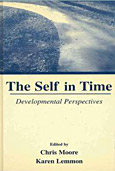Книги
|
|
Оглавление
Preface vii
1 The Nature and Utility of the Temporally Extended Self 1
Chris Moore and Karen Lemmon
2 Language and the Self: Erom the "Experiencing I" to the "Continuing Me" 15
Katherine Nelson
3 Owning Experience: Developing Subjective Perspective in Autobiographical Narratives 35
Robyn Fivush
4 The Anticipated Self: Mother-Child Talk About Future Events 53
Judith A. Hudson
5 The Self: Elevated in Consciousness and Extended in Time 75
Daniel J. Povinelli
6 Personalizing the Temporally Extended Self: Evaluative Self-Awareness and the Development of Autobiographical
Memory 97
Melissa Welch-Ross
7 Planning in 3-Year-Olds: A Reflection of the Future Self? 121
Cristina M. Atance and Daniela K. O’Neill
8 Extending Self-Consciousness Into the Future 141
John Barresi
9 Binding the Self in Time 163
Karen Lemmon and Chris Moore
10 Episodic Memory: Essential Distinctions and Developmental Implications 181
Josef Perner
11 The Child in Time: Temporal Concepts and Self- Consciousness in the Development of Episodic Memory 203
Teresa McCormack and Christoph Hoerl
12 Levels of Consciousness of the Self in Time 229
Philip David Zelazo and Jessica A. Sommerville
Author Index 253
Subject Index 261
Contributors 267
Предисловие
As the chapters in this volume will attest, there are a variety of routes to an interest in the idea of the self in time. We first became interested in the topic in considering the function of theory of mind. Having a theory of mind had always been supposed to be useful in the organization of social behavior. However, it also seemed to us to be an essential component of the organization of one’s own future behavior. In other words, to show adaptive future behavior, the child must come to grips with the idea that his or her own immediate mental states are connected to his or her own future mental states. Meanwhile, in the memory literature, research on episodic and autobiographical memory seemed to require the notion of an extended self. In particular, the developmentalists working on early memory were forced to tackle head on the relations between autobiographical memory and self-development. And then there were those with perhaps a more direct interest in self-development faced with the idea that mirror self-recognition did not seem to capture all that was entailed by having an understanding of self. This convergence of a variety of research interests around the notion of the temporally extended self called out for an attempt at integration, and so, in 1997, we organized a symposium at the meeting of the Society for Research in Child Development in Washington, DC. This volume is an expanded version of that symposium. We are grateful to Judi Amsel for her faith in the project and for her encouragement. Judi was a great ally for developmental psychology during her time with Lawrence Erlbaum Associates. We are also most grateful to Bonita D’Amil and Sarah Wahlert of Lawrence Erlbaum Associates for their excellent editorial work.
- Chris Moore
- Karen Lemmon
Мы не можем предоставить возможность скачать книгу в электронном виде.
Информируем Вас, что часть полнотекстовой литературы по психолого-педагогической тематике содержится в электронной библиотеке МГППУ по адресу http://psychlib.ru. В случае, если публикация находится в открытом доступе, то регистрация не требуется. Часть книг, статей, методических пособий, диссертаций будут доступны после регистрации на сайте библиотеки.
Электронные версии произведений предназначены для использования в образовательных и научных целях.

